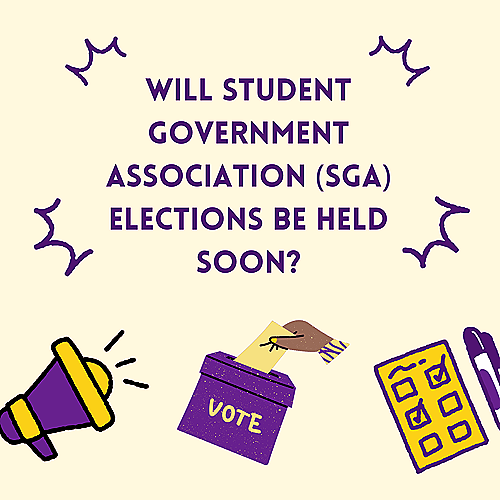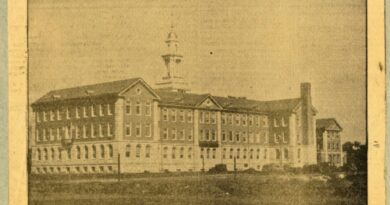Will Student Government Association (SGA) Elections Be Held Soon?
Written by Crista Fiala
In November 1944, the campus newspaper from the time called the Targe announced, “S.J.C. [Saint Joseph College] Installs Student Government” consisting of “an elected group of students who will represent the entire body of legislating, executing, and enforcing all rules concerning the non-academic and recreational activities in our college.” Having only been eight years since Saint Joseph College officially became a four-year college in 1936, the decision to form a student government was likely a significant and celebrated achievement for the young institution. Student Government Association (SGA) has become a vital part of how the University of Saint Joseph functions today. As mentioned in a previous article, it is so vital, in fact, that it is outlined in the student handbook as a right for students to have a representative government.
During the 2022-2023 school year, no SGA elections were held. At the end of that year, the decision for SGA’s annual elections to be postponed until fall 2023 was clearly stated in an email sent to all students. However, the fall 2023 semester is more than halfway over, and there have not been any updates. This article sets out to explore the recent history of SGA and its importance for students at USJ. Former SGA Senator Meral Komina (Class of 2025) says in an interview, “I was a Senator at USJ in fall 2021, and I wanted to join because Jay [Henderson] was good with student activities and with student feedback. I wanted to be a voice for our school as a commuter nursing student. I guess student government died. No one told me anything else about it this year.” Komina is one of many students who find great importance in SGA’s ability to represent the student body and are disappointed by its absence.
In an interview, SGA Senator Hannah Fitzgerald (Class of 2024) says how, in regard to “clubs and organizations, we were able to grant budgets and allow spending for student activities or merchandise.” Besides academics, students from all colleges and universities participate in extracurricular activities like clubs. Clubs can give students an opportunity to develop friendships and to take part in activities they are passionate about outside of the classroom. One of SGA’s major roles is to regulate and keep clubs functioning. The SGA constitution outlines exactly what clubs should do in order to be considered active. For example, Article 1 Sec. 1A of the constitution last updated in 2020 explains, “Clubs and student organizations must hold a minimum of two (2) meetings per month tracked by submitted minutes.” Problematically, as described in the previous article on SGA, SGA has gone against its constitution and bylaws since it has not posted meeting minutes since April 2021. In an interview that USJ News Nest Editor-in-Chief Samuel Turgeon conducted at the end of last year, former SGA President Alex Amoro explains, “In my time as president, I’ve tried to focus on adjusting SGA to fit the university. SGA at our university was built on a structure designed for a much bigger university. Our policies and procedures do not align with something that a typical state school would do. Therefore, we need to adjust our constitution and our bylaws in order to fit with a smaller university. We’ve been working on the bylaws, and I hope to have the constitution and bylaws finalized by the time that I leave. I want to prevent future SGAs from having to worry about this.” Although Amoro does not specify what he means by changing the constitution and bylaws to better suit USJ as a smaller university, it appears that he had the goal to change these documents and possibly the structure of SGA before the end of his presidency. Since my.usj.edu still has the bylaws and constitution from 2020 posted, Amoro and SGA likely did not accomplish this goal.
SGA’s neglect of its constitution and bylaws as well as Amoro’s desire to alter these important articles for a smaller university begs the question of whether or not USJ’s future lies in a smaller and less involved SGA. Recently, possibly in lieu of SGA meetings, Dean of Student Life Brandon Dawson has held informal “Town Hall” meetings to hear student ideas and feedback. USJ News Nest Reporter Khang Dang attended one of these events in McGovern Hall on September 26 from 7 p.m. to 8 p.m., and says that he heard a few students complain about some issues with the residence halls, but very few people attended. The interviews with Fitzgerald and Komina are below for each reader to consider the importance of SGA from these students’ perspectives.
The News Nest will keep you posted on SGA’s developments.
Interview with Hannah Fitzgerald:
When did you work for SGA and for how long? What was your position? What made you want to join?
“I started working as an SGA senator in the fall of my freshman year, 2020. I maintained the senator role up until the spring of my junior year. In my freshman year, I really wanted to get involved as much as I could, and I found that a lot of the clubs and organizations I was a part of relied on SGA. I joined when the election opened for new members, and I didn’t realize until after I joined how much communicating I would do with other groups on campus.”
As a side note, since Fitzgerald is not sure of SGA’s continuation, she tells me she is also unsure if she is currently a senator.
How has SGA functioned throughout the time you were working with the organization? Who did
you work with?
“SGA played a very active role on campus during my first two years as a senator. We held weekly meetings hosting guest speakers from around campus as well as open forums open to all students. SGA was mainly in charge of keeping up with student clubs and organizations as well as approving club activities or budgets. We hosted large events including Fall Flex and SGA Day and collaborated with groups during their events. SGA mainly functioned as a central point for students, faculty, and staff to discuss concerns on campus, share plans for club and org events, and share and develop ideas of how we can improve student experiences. As a senator, I mainly worked with other senators and participated in the general body meetings. We also worked with staff and faculty either during the meetings or outside. Students that were representing a club or org would be in charge of reporting any updates they had to the SGA. SGA senators would also be given the responsibility to share any campus events or updates to peers or staff and faculty. In my second year as a senator, we had smaller groups where senators worked with E-Board members on different tasks.”
What did you and the organization accomplish while you were a part of SGA? Anything you were proud of? Anything you were frustrated with?
“A lot of the campus-related concerns or ideas that students brought up during meetings were preliminary and often required further communication between E-Board members, advisors and USJ directors, such as the Director of Student Affairs, the Director of Student Health Services, etc. But regarding clubs and organizations, we were able to grant budgets and allow spending for student activities or merchandise.”
What is your role now? If you no longer work with them, on what terms did you leave?
“I am still a senator if SGA is still around. If it is no longer around, I was an active senator up until the end of my junior year when the club was no longer actively holding meetings. The E-Board still held the open forum aspect but only a few times a year. The open forums were usually held in the McGovern dining hall during lunchtime. Unfortunately, this made it difficult for a lot of the senators and other students to attend and remain active.”
What do you think is the importance of having a student government on campus?
“The SGA held a big role on campus, not just with addressing students’ concerns or ideas or with monitoring clubs and organizations but with holding events and engagement activities. Students were involved in creating these events, which made them more exciting for others to participate in. We usually had a pretty great turnout. The open forum part of SGA was also extremely important for student involvement. Students that had questions, concerns, or ideas about campus policies, activities, or their overall experiences were able to express these to the group. This was important especially if these students did not know who to speak to or if they did not feel comfortable speaking to staff or faculty. This gave the E-Board a big role as they would usually be the ones responsible for relaying the information to the proper individual and following up with the students about their concerns. Having an SGA on campus is important because it allows more students to have a voice rather than only a few. Students are able to approve changes in student clubs and organizations as well as campus-wide changes. Having an SGA also diffuses the responsibility away from one person and towards multiple people, which makes getting things done more efficient. It also gives students the opportunity to speak with staff and faculty, and directors, independently and represent their peers. This gives students great professional development skills including communication, networking, and advocacy.”
Interview with Meral Komina:
When did you work for SGA and for how long? What was your position? What made you want to join?
“I was a Senator for USJ in fall 2021, and I wanted to join because Jay [Henderson] was good with student activities and with student feedback. I wanted to be a voice for our school as a commuter nursing student. I guess student government died. No one told me anything else about it this year. From my first campus visit, I fell in love with USJ. That’s why I wanted to join. I loved USJ and my peers. I want to make USJ a more enjoyable place for everyone to receive an education. That’s why I ran for a student government position.”
How has SGA functioned throughout the time you were working with the organization? Who did you work with?
“I worked with Jay Henderson. There were weekly meetings at lunchtime with lunch provided. There were reports from the chair members, attendance was taken, and questions and concerns from students were encouraged and addressed.”
What did you and the organization accomplish while you were a part of SGA? Anything you were proud of? Anything you were frustrated with?
“I remember residential issues with mold and cleanliness were addressed because students mentioned this in the meeting. Clubs were funded by student government. Jay asked students what they would like to see from student activity events, and this made us feel like we had a voice and a choice. We were frustrated with all the blocks in the system, like how gift cards for prizes were not allowed.”
What is your role now? If you no longer work with them (and still attend USJ), on what terms did you leave?
“I was never informed of future meetings. I do not know if student government exists anymore.”
What do you think is the importance of having a student government on campus?
“Having Student Government Association on campus is important because it gives students a voice on significant topics that affect them, such as school policy, events, and financing, by participating in student government activities. Students gain a sense of responsibility and ownership for their education as a result, which makes them feel more a part of their school and more connected to it. Overall, it improves campus life and USJ experience.”




